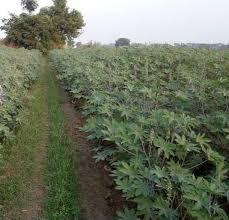Pakistan is exploring the large-scale cultivation of castor as part of its broader strategy to diversify agriculture, enhance export potential, and improve farmer livelihoods, Federal Minister for National Food Security and Research Rana Tanveer Hussain announced on Wednesday.
Presiding over a high-level meeting with representatives from the International Multi Group of Companies, led by Chairman Amjad Rashid, Hussain said castor offers significant promise due to its adaptability and profitability. The Ministry of National Food Security, in an official statement, described castor as a low-input, high-yield crop well suited for Pakistan’s arid and semi-arid regions.
“Castor can be grown in barren areas where traditional crops struggle, making it ideal for land optimisation and income generation for farmers,” the minister stated. He noted that the crop is currently fetching Rs7,000 per 40kg in the local market — a price higher than most conventional crops.
The initiative has gained further momentum with the involvement of a Chinese not-for-profit partner, which has pledged to provide high-quality hybrid seed. This intervention could potentially double yields from the current 50 to 100 maunds per acre.
In a promising development, the visiting company expressed readiness to sign formal agreements with local farmers, offering to purchase the entire castor harvest at pre-agreed terms — a move expected to reduce market uncertainty and encourage farmer participation.
To facilitate the rollout, the ministry will coordinate with provincial agriculture departments to launch awareness campaigns and distribute seeds.
Hussain also highlighted Pakistan’s potential to become a competitive player in the global castor oil market, citing robust demand in industries such as pharmaceuticals, cosmetics, lubricants, and biofuels.
The meeting concluded with consensus on launching pilot projects, finalising farmer contracts, and building a sustainable, export-oriented castor value chain in Pakistan.




